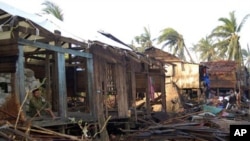International aid agencies are rushing emergency assistance to tens of thousands of victims of Cyclone Giri, which struck the western coast of Burma, also known as Myanmar, on October 22. A U.N. assessment of affected areas finds the cyclone has left a trail of widespread destruction.
A preliminary United Nations and government assessment of four heavily affected areas finds water and sanitation needs along with food and shelter are the most urgent needs.
Government figures confirm 45 deaths, with at least 10 people missing and nearly 50 injured. The latest reports put the number of people affected by Cyclone Giri at about 200,000.
U.N. Children's Fund Spokeswoman Marixie Mercado says more than 80,000 people are homeless, having lost their homes and all their belongings. "A number of villages and islands around the coast have lost most or all of their fresh-water sources and are expected to face serious water-shortages as the rainy season is over. At least 57 health centers were destroyed or require immediate repairs. Also, most boats, which were the sole means of transport used by health providers to get to these islands were washed away or destroyed," she said.
The Food and Agriculture Organization estimates more than 15,000 hectares of paddy were destroyed just weeks before the harvest was due to begin. Aid agencies expect about 200,000 people will require food assistance during the coming three months.
The United Nations says the World Food Program and several international non-government organizations have started food distributions.
The Burmese government says it urgently needs tarpaulins to shelter the homeless. It notes tents are not suitable because the weather is too hot in the affected areas.
UNICEF Spokeswoman Mercado says her agency has sent emergency workers to the worst affected areas and is preparing a 90-day plan to address priority needs.
She says UNICEF is taking a lead role in coordinating the provision of nutrition, water and sanitation and hygiene needs, as well as education. "So far, UNICEF has distributed 15 out of 40 emergency health kits, pre-positioned before the cyclone. Family kits, tarpaulin, medicine, and water purification items are being distributed now through the Myanmar Red Cross and partners. Nutrition supplies are also pre-positioned for distribution. UNICEF and local partners are working to set up temporary learning spaces with tarpaulin and bamboo and to provide emergency school supplies, furniture and latrines," she said.
The United Nations says expects to launch funding appeals in the coming days as needs become clearer.
Burma Devastated by Cyclone Giri
- By Lisa Schlein




